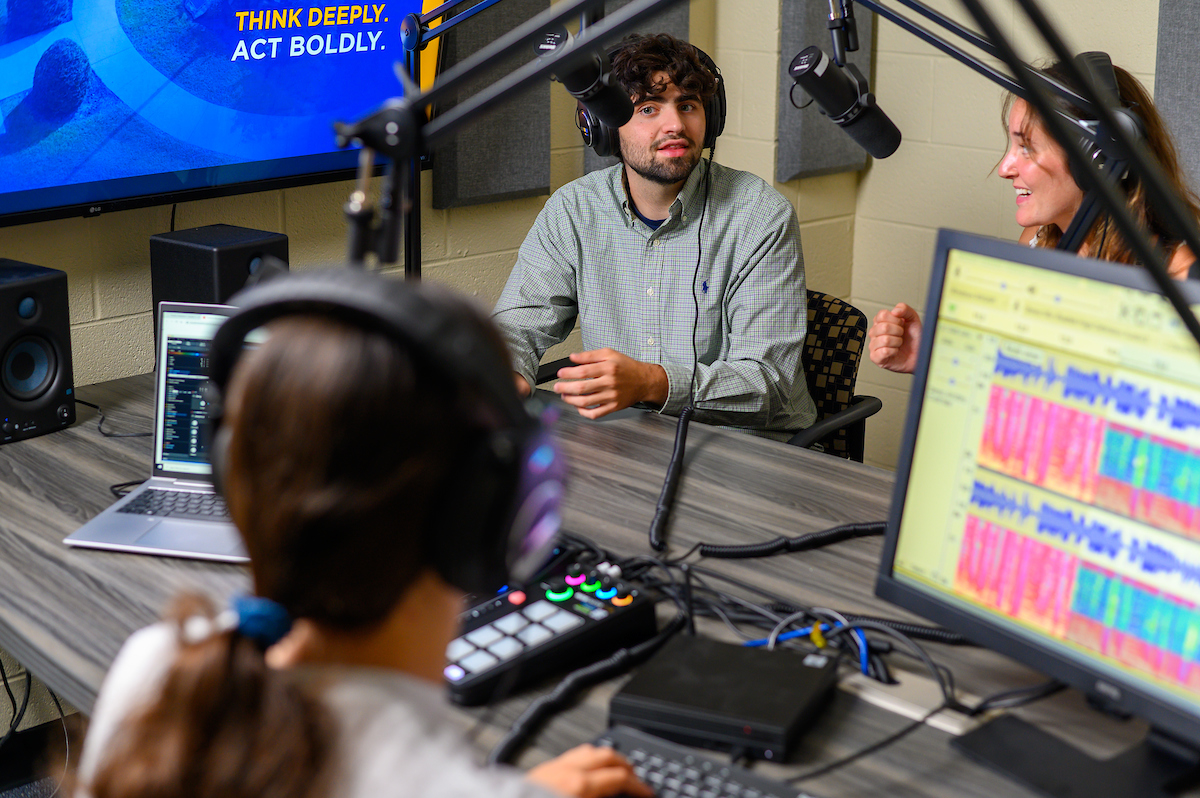
Download Image: Web
Fulfilling the requirements of a $150,000 grant from the National Endowment for the Humanities (NEH) in support of the Humanities Research Center, Lycoming College today launched the Lycoming College History Podcast Series. The podcasts serve the dual purpose of functioning as one component of a larger strategy to digitally preserve the institution’s 200+ year history, as well as providing research experiences for student interns as they prepare to embark on careers or graduate studies.
"Our students and faculty are doing fascinating and important research that helps us understand our culture, history, and community. The more we can share that knowledge, the more beneficial humanistic studies are for everyone."
For nearly a year, student-faculty podcast teams have worked in unison to address an important moment or movement in the College’s history, especially as it relates to local and national historical contexts, fusing research, interviews, podcast development, and work with Lycoming College Archives and other local entities. The production’s first season covers a broad swath of College history, ranging from a look at the indigenous history of Williamsport with “Before 1812: An Indigenous History of Williamsport,” to a more recent, current day account of the College’s increasingly diverse student population with “Hispanic Voices of Lycoming.”
“When we organized the podcast series, we wanted to draw on faculty research expertise in ways that would intersect with student interests and allow them room to develop as scholars. We wanted students to draw on their summer research and interviews to create exciting stories about the College history that would interest students, alumni, and the community,” said Andrew Leiter, Ph.D., professor of English and director of the HRC. “The HRC hopes the podcast series can serve as a model for integrating more public-facing humanities research into existing and new courses at Lycoming. Our students and faculty are doing fascinating and important research that helps us understand our culture, history, and community. The more we can share that knowledge, the more beneficial humanistic studies are for everyone.”
The following podcasts and accompanying digital exhibits are available for listening through the Lycoming College Institutional Repository.
Lycoming 1969
Dominick Philip ’24, economics, philosophy, and comparative literature triple major with a minor in German, worked on the project with Andrew Leiter, Ph.D., professor of English and director of the HRC.
Released April 2, 2024
Hispanic Voices of Lycoming
Amelia Thompson ’26, archaeology major and Spanish minor, worked on the project with Rubén Varona, Ph.D., assistant professor of Spanish.
Available April 9, 2024
Before 1812: An Indigenous History of Williamsport
Mackenzie Holmes ’25, history and English double major, worked on the project with Christopher Pearl, Ph.D., associate professor of history.
Available April 16, 2024
Breaking Barriers: A Path for Women and People of Color in the Legal Profession
Rei Saar ’25, Spanish and political science double major with a French minor, worked on the project with Susan Achury, Ph.D., assistant professor of political science.
Available April 23, 2024
Lycoming Warriors and the Native American Mascot
Alicia Purcell ’24, anthropology and Spanish double major, worked on the project with Ryan Adams, Ph.D., associate professor of anthropology.
Available April 30, 2024
A portion of the NEH funding enabled the College to establish a one-button studio — a professional-grade, user-friendly, digital audio/video recording and editing studio. Students and faculty involved in the series launch participated in a two-week training seminar featuring guest speakers, instructional sessions, and technical training, including workshops with alumni skilled in podcasting and oral histories.
The second season of the Lycoming College History Podcast Series is slated for release in the spring of 2025 with five new student interns beginning work on the new season this summer. The second season will tackle topics such as Black student activism at Lycoming College, the Covid-19 pandemic, College Archive treasures and oddities, athletics at Lycoming, and a history of the Lycoming College art collection.
The Lycoming College History Podcast Series has been made possible in part by a major grant from the National Endowment for the Humanities: Humanities Initiatives. Additional funding was provided by Bill ’70 and Sarah Turnbaugh for archival research facilitated by Sue Fulton.
About the Humanities Research Center
The Humanities Research Center enhances educational opportunities for students majoring or minoring in any of the humanities by supporting collaborative student-faculty research, internships, guided scholarship, study abroad opportunities, education certification, digital humanities, graduate school placement, and fellowships. As a vibrant physical space celebrating student excellence in the humanities, the center advocates for cultural literacy and creates a supportive atmosphere that encourages students to engage in interdisciplinary research and professional development. The Humanities Research Center is dedicated to developing students' thoughtful engagement with the world around them and launching successful careers.
About the Institutional Repository
The Lycoming College Institutional Repository preserves Lycoming’s institutional knowledge and provides open, online access to a digital history of the College. The work incorporated here includes but is not limited to student and faculty scholarship across all disciplines, materials from the Humanities Research Center (HRC) and from the Lycoming College Archives, as well as other institutional publications. The repository contributes to the history and culture of the greater Williamsport community and enables the College to become more involved with and interact with the surrounding community.